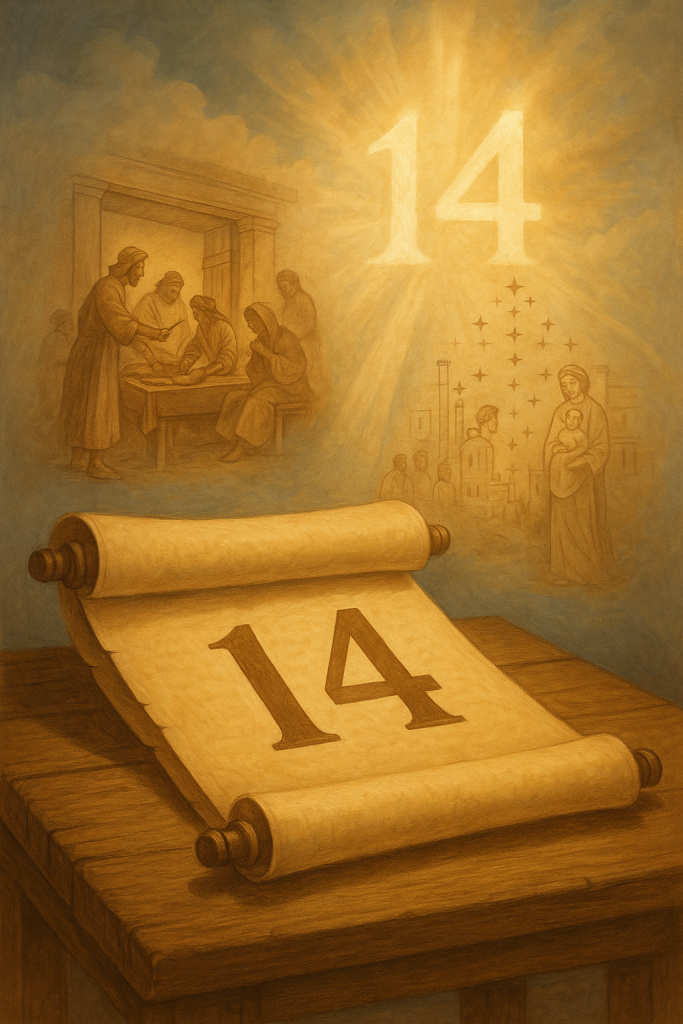In the Bible, the number 14 biblical meaning carries a deep message of divine fulfillment and liberation. It appears in moments where God’s promises reach their completion a symbol that connects human history with spiritual restoration. The number 14 is closely tied to the number 7, which often represents perfection, completion, and divine order. When multiplied by two, fourteen reflects a “double measure” of completeness the moment when what was promised by God becomes reality.

From the deliverance of Israel on the fourteenth day of the first month to the structured genealogy of Jesus in Matthew 1:17, this number marks turning points of redemption. It reminds believers that God’s timing is precise, His plans are complete, and every cycle of struggle leads to renewal.
Ultimately, the number 14 meaning in Bible passages shows that divine fulfillment is not random but intentional. It reflects the perfect balance between promise and manifestation, encouraging us to trust that every divine process, even when delayed, will reach its appointed time.
Number 14 Meaning in Bible
The number 14 meaning in Bible passages often points to moments of freedom and divine transition. One of the most significant examples appears in Exodus 12, where God commands His people to celebrate the Passover on the fourteenth day of the first month. That day marked the Israelites’ liberation from Egypt a moment when slavery ended, and a new covenant journey began. The number 14, therefore, became a sacred reminder that God’s deliverance always arrives at the appointed time.
In the New Testament, this pattern continues. In Matthew 1:17, the genealogy of Jesus is intentionally structured into three sets of fourteen generations — from Abraham to David, from David to the Babylonian exile, and from the exile to Christ. This precise organization emphasizes a divine rhythm: every era of struggle is followed by restoration, and every promise ultimately finds fulfillment in Christ.
Through these patterns, the number 14 biblical meaning expands beyond simple arithmetic. It reflects liberation, renewal, and the unfolding of God’s perfect plan a powerful reminder that every ending in Scripture is also the beginning of something new.
Read also our article about: Biblical Meaning of Water in a Dream.
The Genealogy of Christ and the Power of Fourteen
The Gospel of Matthew presents one of the most fascinating uses of biblical structure, where the number 14 biblical meaning becomes a key to understanding God’s intentional design. Matthew 1:17 divides the lineage of Jesus into three distinct groups of fourteen generations from Abraham to David, from David to the Babylonian exile, and from the exile to Christ. This is far from accidental; it is a deliberate literary pattern that highlights the unfolding of divine promise through history.
The number 14 meaning in Bible context here represents both continuity and completion. Abraham symbolizes faith and the beginning of God’s covenant with humanity. David represents kingship and divine authority. Jesus embodies redemption the fulfillment of all that came before. The repetition of fourteen forms a symbolic bridge, showing that every era in the genealogy points toward the Messiah’s arrival.
By organizing the generations this way, Matthew underscores that God’s plan moves in perfect cycles. What began with promise in Abraham found royal establishment in David and reached ultimate fulfillment in Christ. The number 14 stands as a reminder that divine timing is precise, purposeful, and rooted in redemption.
The Symbolic Connection Between 7, 14, and Divine Completeness
Throughout Scripture, numbers often carry profound spiritual significance. The number 7 is widely recognized as the symbol of divine perfection and completeness — seen in the seven days of creation, the seven spirits before God’s throne, and the seven seals in Revelation. When we look at the number 14, we find that it represents a “double measure” of that same completeness. In essence, the number 14 biblical meaning reveals not only the perfection of God’s plan but its fulfillment in action.
If seven marks the beginning of divine order, fourteen represents its continuation and completion. It’s the moment when what was set in motion by God reaches maturity. This is reflected in biblical patterns such as the Passover on the fourteenth day, symbolizing that God’s promise of deliverance had reached its appointed time.
In theological terms, the number 14 meaning in Bible passages suggests that God’s perfection is not static it grows, multiplies, and manifests through time. Just as the Israelites moved from bondage to freedom and Jesus’ lineage progressed from promise to fulfillment, the number 14 reminds believers that divine completeness is both a process and a destination. It’s a call to trust that what God begins, He always brings to completion.
Read also our article about: Biblical Meaning of Cleaning a House in a Dream.
Applying the Meaning of Number 14 to Spiritual Life Today
Understanding the number 14 biblical meaning offers more than historical insight it provides a timeless lesson for personal faith and spiritual growth. In Scripture, the number 14 marks moments when God fulfills promises and brings His people into new beginnings. This same truth can guide believers today, reminding us that every season of waiting or struggle eventually gives way to freedom, renewal, and restoration.
When we study the number 14 meaning in Bible passages, we see that liberation is not just an ancient event but an ongoing reality. God still leads His people out of spiritual bondage, offering grace where there was guilt and purpose where there was pain. The cycles represented by fourteen from promise to fulfillment mirror the rhythms of our own lives: repentance leading to forgiveness, effort leading to breakthrough, and faith leading to divine reward.
In daily life, this means trusting God’s timing even when the path seems uncertain. The message behind the number 14 encourages believers to embrace spiritual completeness not as perfection, but as growth through each stage of God’s plan.


